If you're thinking of volunteering in Tohoku...A Packing List
As an epilogue to my week of posts about my week in Tohoku volunteering with the NGO Peace Boat in the tsunami-devastated city of Ishinomaki, Miyagi Prefecture, I would like to offer a few practical suggestions for those who plan to volunteer. Packing for a relief trip is a bit different from packing for most ordinary camping trips. Camping in a disaster area means camping with a limited water supply, and there's little water for cleaning dishes, cooking, and washing yourself. Camping in a relief area also requires some extra precautions in that volunteers need to be prepared with enough food, water, means of communication, clothing, etc. should an aftershock disrupt services further.
At the Peace Boat orientation sessions offered on Saturday evenings in Tokyo, participants receive packing lists and information about the volunteer work. Below is a list that includes Peace Boat suggestions mixed in with those of my team. The list of items is long and may seem like a lot of stuff to pull together, but keep in mind that most of these items are good to have on hand anyway in an earthquake-prone country like Japan.
camping gear
tent with tent fly, stakes, poles
ground sheet/tarp for under tent
sleeping mat
sleeping bag
cook stove for camping
gas for cook stove
windscreen for cook stove
mess kit--pans/dishes/cup
utensils for cooking and eating
matches/lighter
headlamp, LED, for use at campsite/going to toilet at night
small LED lantern with batteries for inside tent
tiny, folding camp stool if you have one
plastic sheet (to sit on or for boots, etc.)
padlocks for tent doors
clips, S hooks, rubber bands
clothes and gear for volunteer work
helmet if you have one (if not, Peace Boat has these)
waterproof suit--lightweight, breathable
safety boots (anzen nagagutsu)
metal insoles for your boots if you can find them
socks that fit well with your boots
full roll of gum tape for taping boots to pants
(so water/debris can't enter boots)
headlamp, LED
(a second one that you can keep taped to your helmet is nice)
safety goggles
masks--the types worn by construction workers
leather gloves
latex rubber gloves for inside leather gloves
(keep hands dry, warm, protected)
rugged rubber gloves with long arms for wet work
towels--onsen size, for neck to keep out dust, for drying off
wet wipes/hand sanitizer
tissues (toilets at work sites might not have paper)
bandanas/tenugui for wrapping head
(keeps hair/head clean, helps helmet fit)
T-shirts--dry-type for wicking sweat
lightweight warm layer to add in the morning/at end of work day
water bottles
day pack to hold lunch, water, camera, different gloves, wipes, etc.
Swiss Army knife/Leatherman multi-tool is helpful
camping clothes
underwear, socks
lightweight, warm top layers
jeans
slip-on rugged shoes or sneakers
sleepwear/leggings/hooded sweatshirt
jacket for cold evenings
hat for cold evenings
thin gloves for cold evenings
food and water
4-6 liters of water
(Peace Boat provides a water truck for refilling water bottles)
funnel for filling water bottles from water truck hose
granola bars, soy joy, calorie mate
nuts
dried fruit
muesli or granola
powdered milk
onigiri for the first few days
hearty bread or stay-fresh Delba bread
peanut butter
salami
dried fish
instant noodles (especially the eco pack cup noodles)
small canned items like beans or tuna
dried vegetables (good with noodles)
curry in single-serving retort pouches (good with noodles)
instant miso soup and fixings of dried wakame, tofu, etc.
other instant meals, MREs, zosui in retort pouches
chocolate
sweets to share
tea/herb tea/instant coffee/cocoa
zip-close bags
plastic wrap (to set inside dishes for waterless clean up)
other items
hand sanitizer
body wipes
facial wipes
small tissue packs
no-water alcohol shampoo
toiletries including nail clippers, cotton swabs, eye drops, lotion,
sunscreen, some shampoo
basic first aid items--antibiotic ointment, bandages, fever reducer, etc.
hot water bottle--small (for inside sleeping bag on cold nights)
adhesive body warmers (for cold nights)
inflatable pillow (for overnight bus and tent)
camera (and extra battery if necessary)
radio--small, battery operated, in case of emergency, news
cell phone (there was reception in all areas our team visited)
cell phone charger--battery or solar power
(try to find a charger not just an emergency battery)
extra batteries for everything
laundry hanging apparatus, small--for drying gloves, towels, socks
extra trash bags--to keep things dry, to separate smelly clothes, etc.
folding umbrellapens and permanent marker for labeling
small notebook and journal
money for bus, small purchases, and in case of emergency
health insurance card
foreign registration card/copy of passport
Japanese driver's license if you have one
phone numbers for emergency contact
(in case of cell phone service disruption)
Luggage
large backpack (or suitcase)
daypack to take to worksite
small bag
folding luggage cart for easy lugging of tent, etc.
Here are a few photos that may be helpful:
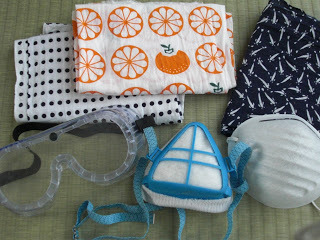 clockwise from top left: tenugui, work masks, safety goggles
clockwise from top left: tenugui, work masks, safety goggles
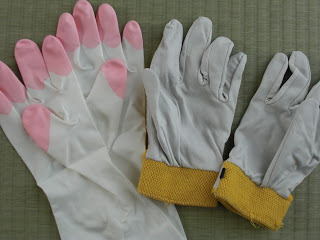 latex gloves and leather gloves
latex gloves and leather gloves
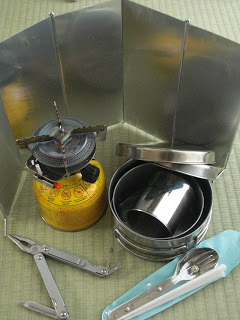 clockwise from top left: cook stove, wind screen, mess kit, untensils, Leatherman multi-tool
clockwise from top left: cook stove, wind screen, mess kit, untensils, Leatherman multi-tool
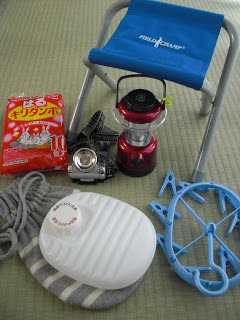 clockwise from top left: adhesive body warmers, LED headlamp, small lantern, camp stool, drying apparatus, small hot-water bottle
clockwise from top left: adhesive body warmers, LED headlamp, small lantern, camp stool, drying apparatus, small hot-water bottle
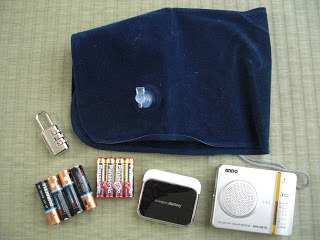 clockwise from top left: combination padlock, inflatable pillow, radio, emergency cell phone battery, batteries
clockwise from top left: combination padlock, inflatable pillow, radio, emergency cell phone battery, batteries
Wishing you a safe and fulfilling volunteer experience!
At the Peace Boat orientation sessions offered on Saturday evenings in Tokyo, participants receive packing lists and information about the volunteer work. Below is a list that includes Peace Boat suggestions mixed in with those of my team. The list of items is long and may seem like a lot of stuff to pull together, but keep in mind that most of these items are good to have on hand anyway in an earthquake-prone country like Japan.
camping gear
tent with tent fly, stakes, poles
ground sheet/tarp for under tent
sleeping mat
sleeping bag
cook stove for camping
gas for cook stove
windscreen for cook stove
mess kit--pans/dishes/cup
utensils for cooking and eating
matches/lighter
headlamp, LED, for use at campsite/going to toilet at night
small LED lantern with batteries for inside tent
tiny, folding camp stool if you have one
plastic sheet (to sit on or for boots, etc.)
padlocks for tent doors
clips, S hooks, rubber bands
clothes and gear for volunteer work
helmet if you have one (if not, Peace Boat has these)
waterproof suit--lightweight, breathable
safety boots (anzen nagagutsu)
metal insoles for your boots if you can find them
socks that fit well with your boots
full roll of gum tape for taping boots to pants
(so water/debris can't enter boots)
headlamp, LED
(a second one that you can keep taped to your helmet is nice)
safety goggles
masks--the types worn by construction workers
leather gloves
latex rubber gloves for inside leather gloves
(keep hands dry, warm, protected)
rugged rubber gloves with long arms for wet work
towels--onsen size, for neck to keep out dust, for drying off
wet wipes/hand sanitizer
tissues (toilets at work sites might not have paper)
bandanas/tenugui for wrapping head
(keeps hair/head clean, helps helmet fit)
T-shirts--dry-type for wicking sweat
lightweight warm layer to add in the morning/at end of work day
water bottles
day pack to hold lunch, water, camera, different gloves, wipes, etc.
Swiss Army knife/Leatherman multi-tool is helpful
camping clothes
underwear, socks
lightweight, warm top layers
jeans
slip-on rugged shoes or sneakers
sleepwear/leggings/hooded sweatshirt
jacket for cold evenings
hat for cold evenings
thin gloves for cold evenings
food and water
4-6 liters of water
(Peace Boat provides a water truck for refilling water bottles)
funnel for filling water bottles from water truck hose
granola bars, soy joy, calorie mate
nuts
dried fruit
muesli or granola
powdered milk
onigiri for the first few days
hearty bread or stay-fresh Delba bread
peanut butter
salami
dried fish
instant noodles (especially the eco pack cup noodles)
small canned items like beans or tuna
dried vegetables (good with noodles)
curry in single-serving retort pouches (good with noodles)
instant miso soup and fixings of dried wakame, tofu, etc.
other instant meals, MREs, zosui in retort pouches
chocolate
sweets to share
tea/herb tea/instant coffee/cocoa
zip-close bags
plastic wrap (to set inside dishes for waterless clean up)
other items
hand sanitizer
body wipes
facial wipes
small tissue packs
no-water alcohol shampoo
toiletries including nail clippers, cotton swabs, eye drops, lotion,
sunscreen, some shampoo
basic first aid items--antibiotic ointment, bandages, fever reducer, etc.
hot water bottle--small (for inside sleeping bag on cold nights)
adhesive body warmers (for cold nights)
inflatable pillow (for overnight bus and tent)
camera (and extra battery if necessary)
radio--small, battery operated, in case of emergency, news
cell phone (there was reception in all areas our team visited)
cell phone charger--battery or solar power
(try to find a charger not just an emergency battery)
extra batteries for everything
laundry hanging apparatus, small--for drying gloves, towels, socks
extra trash bags--to keep things dry, to separate smelly clothes, etc.
folding umbrellapens and permanent marker for labeling
small notebook and journal
money for bus, small purchases, and in case of emergency
health insurance card
foreign registration card/copy of passport
Japanese driver's license if you have one
phone numbers for emergency contact
(in case of cell phone service disruption)
Luggage
large backpack (or suitcase)
daypack to take to worksite
small bag
folding luggage cart for easy lugging of tent, etc.
Here are a few photos that may be helpful:
 clockwise from top left: tenugui, work masks, safety goggles
clockwise from top left: tenugui, work masks, safety goggles
 latex gloves and leather gloves
latex gloves and leather gloves
 clockwise from top left: cook stove, wind screen, mess kit, untensils, Leatherman multi-tool
clockwise from top left: cook stove, wind screen, mess kit, untensils, Leatherman multi-tool
 clockwise from top left: adhesive body warmers, LED headlamp, small lantern, camp stool, drying apparatus, small hot-water bottle
clockwise from top left: adhesive body warmers, LED headlamp, small lantern, camp stool, drying apparatus, small hot-water bottle
 clockwise from top left: combination padlock, inflatable pillow, radio, emergency cell phone battery, batteries
clockwise from top left: combination padlock, inflatable pillow, radio, emergency cell phone battery, batteriesWishing you a safe and fulfilling volunteer experience!
Published on May 18, 2011 06:00
No comments have been added yet.



